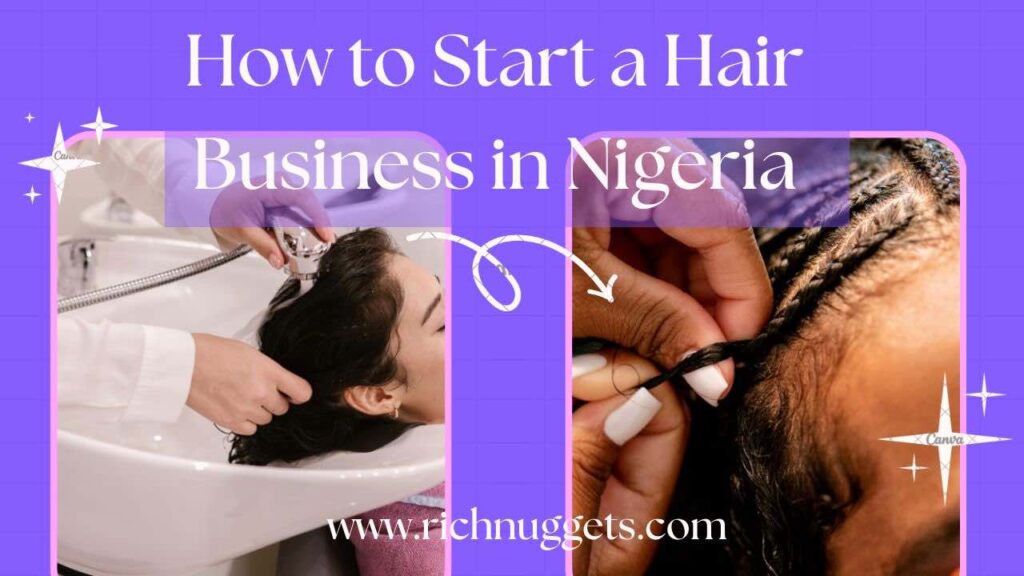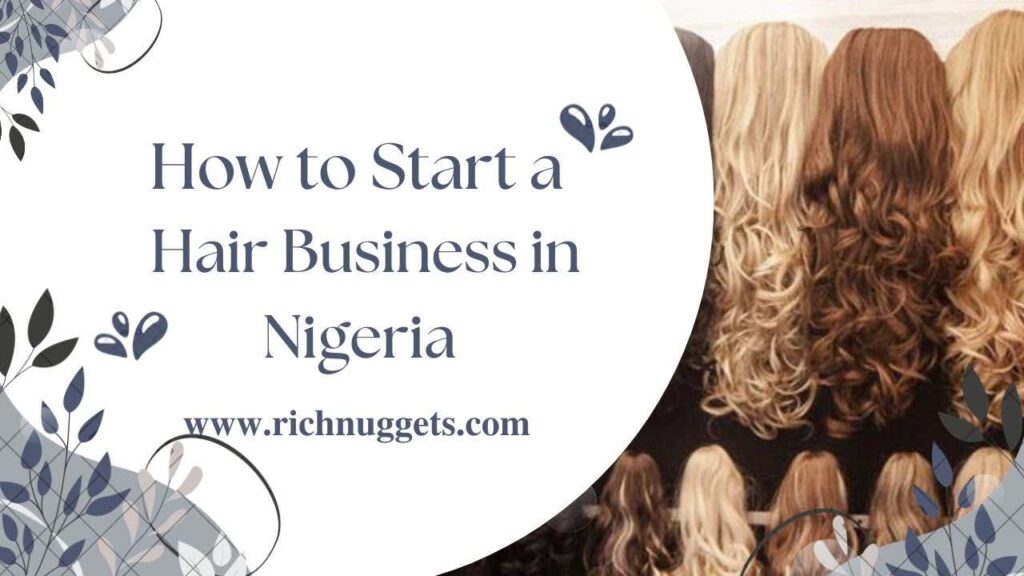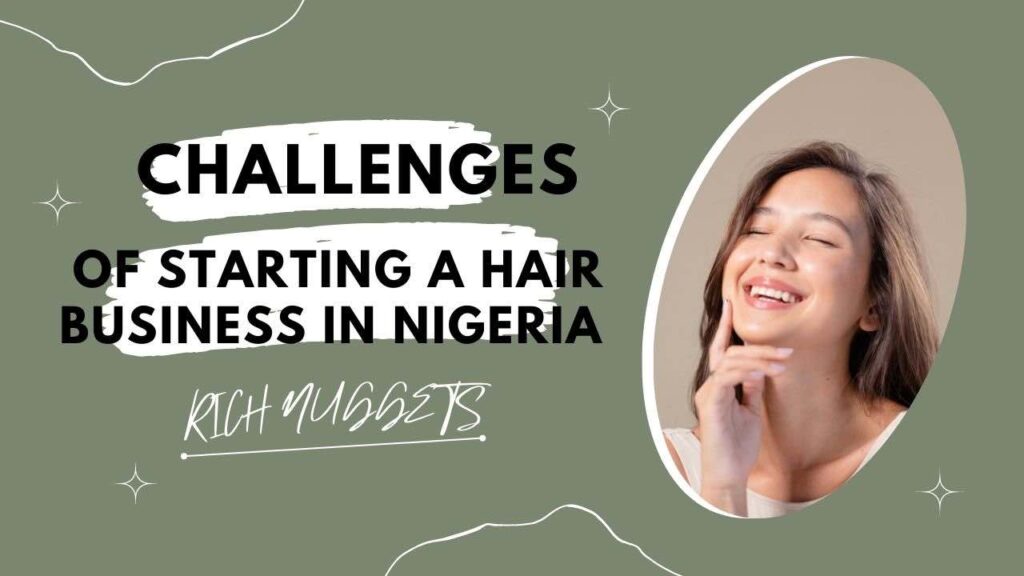
The hair business refers to a business that specializes in the sale of various hair products and services. This business can range from selling hair extensions, wigs, and other hair-related accessories to offering hair care services such as styling, weaving, braiding, and other hair treatments.
The hair industry in Nigeria, like in many other places, is a thriving market due to the cultural importance placed on hair aesthetics and grooming.
The high demand for a wide variety of hair products and services in Nigeria can be attributed to the distinct hair textures and styles among the diverse ethnic groups, as well as the large number of individuals who enjoy regularly changing their hairstyles and exploring various new looks.
Hair businesses in Nigeria can operate through physical stores, online platforms, or a combination of both. They may also choose to import hair products from different parts of the world or source them locally.
In this article “How to Start a Hair Business in Nigeria” we will explore the intricacies of starting a profitable hair business in Nigeria.
Table of Contents
How much do I need to Start Hair Business?

You need a minimum of N1,000,000 to start a profitable hair business that sells only quality hair products (especially wigs). But if your budget is low and your goal is to start with standard products that are still very much acceptable among customers, then a minimum of N500,000 Naira will suffice; as that will get you enough items including wigs to start with.
The primary costs in this business revolve around your inventory. At the initial stage of starting, you can convert your residence into your store, eliminating the need for rent expenses. You’ll also manage the business solo at the outset until customer numbers grow and necessitate bringing in additional help.
Hair business Ideas
Here are hair business ideas that you should consider starting in Nigeria:
- Wig and Extensions Boutique: This type of hair business specializes in selling a wide variety of wigs, hair extensions, and hairpieces. If you decide to start the wig and extension boutique, you can offer different styles, lengths, and textures to cater to various customer preferences.
- Natural Hair Care Products: This hair business involves creating and selling your own line of natural hair care products, including shampoos, conditioners, oils, and treatments. In this line of hair business it is necessary to emphasize the use of organic and natural ingredients to cater to the growing demand for healthier hair care options.
- Mobile Hair Stylist: This type of hair business doesn’t necessarily mean you shouldn’t have a shop, you definitely should, but your services will include what is normally called home service. Those involved in the mobile hair stylist business offer mobile hairstyling services that mandate them to go or travel to clients’ homes or event locations to provide hairstyling, braiding, and other services. This is convenient for clients who prefer getting their hair done in a familiar environment. The advantage of running this mobile hair styling business is the huge financial benefits that follow it.
- Hair Accessories Online Store: This hair business is all about selling a wide range of hair accessories, such as hairpins, headbands, scarves, and more online. It is advisable to curate a collection of trendy and unique accessories to attract customers.
- Salon with a Twist: Just like the name ” salon with a twist”. It is all about giving your salon a twist from the norm. For example, combining hair services with a café or bookstore. This can attract customers looking for a relaxing and multifunctional space.
- Hair Care Workshops: This hair business idea is all about running hair business workshops and seminars that are focused on educating people about proper hair care techniques, styling, and maintenance. These workshops normally attract both professionals and individuals looking to improve their hair care skills.
- Bridal Hair Specialist: This hair business idea specializes in creating stunning bridal hairstyles for weddings and other special occasions. In other to promote your bridal hair specialist business with speed, collaborate with wedding planners and photographers.
- Men’s Grooming Salon: Establish a grooming salon specifically catering to men’s haircuts, beard trims, and grooming needs. Create a masculine and comfortable atmosphere. To know more: The Ultimate Guide to Starting a Profitable Barbing Salon Business in Nigeria
- Children’s Hair Salon: This type of hair business salon is strictly open and dedicated to children’s haircuts and styling. Making the environment kid-friendly with colorful decor, entertainment, and themed chairs can be a way to always keep them coming. Note that this type of hair business may not excel in Nigeria.
- Hair Blog or YouTube Channel: Just like Rich Nuggets, if you are an expert or knowledgeable in the hair business, you can create a website where you share your expertise and make money from the blog through ad sharing or by selling hair-related products. You can also include having a YouTube channel where you share videos (including tutorials).
- Hair Spa Retreat: Combine hair care with relaxation by creating a hair spa retreat that offers luxurious treatments, scalp massages, and aromatherapy in a serene environment. Read more; How to start up a Spa business
- Hair Braiding Studio: This type of hair salon business specializes only in various braiding styles, catering to individuals who want intricate and stylish braided hairstyles.
- Hair Repair and Restoration: Mainly about offering specialized hair treatments and services for damaged hair, helping clients restore the health and beauty of their hair.
- Online Hair Consultations: Provide virtual consultations to clients seeking personalized hair care advice, recommendations, and styling tips based on their specific hair type and concerns.
- Ethnic Hair Care Shop: Focus on providing products and services specifically tailored to the unique needs of various ethnic hair types and textures in Nigeria or in your locality.
Learn: How to Start a Beauty Salon Business: Tips, and Strategies for Success
No matter the type of hair business idea you decide to invest in, make sure you conduct thorough market research, create a detailed business plan, and tailor your business idea to meet the needs and preferences of your target audience in Nigeria.
How to Start a Hair Business in Nigeria

Here is how you can start a hair business in Nigeria:
1. Determine Your Hair Business Niche
The first thing to do when starting a hair business is to define your hair business. You can successfully define your hair business by focusing on a particular niche.
The advantage of focusing on a particular niche is that it makes it easier for your target market to easily differentiate your hair business from your competitors.
You can pick from the numerous types of hair businesses previously mentioned. In choosing the best hair business niche for your hair business some factors must be put in place such as;
- Who is your Target Audience
- Do you have Expertise?
- Do you have a Passion for such niche?
- Can you be Committed: You can only be committed to what you are passionate about
- Sustainability and Longevity of the Niche
- Does it Align with Trends
- How competitive is it (Competitor Analysis)
By positively analyzing these aforementioned factors, you will be able to pick the best hair business niche, for your hair business
2. Market Research and Business Plan
The next step that follows is the market research and business plan of your chosen hair business niche.
Market research focuses on gathering information about your target market, the demand of your chosen niche, market trends, and competition, all for the purpose of decision-making that will position the hair business for success.
While the Business plan is the document that will contain your market research findings and other key elements such as; Business goals, product and service offerings, pricing strategy, marketing approach, financial projections, and Operations and Management.
The main purpose of the business plan is to help you stay on course as you navigate your way to success. You can simply say; a business plan is a road map that guides you on the path that leads to success.
3. Legal Requirements and Registration
The hair business comes with some legal requirements. Though not much but mandatory by the government if you are going to be operating within the legal framework of the business landscape in Nigeria. The necessary legal requirements to be met are;
- Business Name Registration
- Tax Identification Number (TIN)
Apart from that two legal requirements, you might need an additional health and safety certificate if you are going to be running a haircare service on a large scale. But if not, then the aforementioned two legal requirements are enough to run your hair business.
Know more about business registration in NIgeria: How to Register a Business Name in Nigeria in 7 Easy Steps
4. Location and Setup
Location and setup is another key aspect that must be taken with careful consideration. The right location will give your hair business a good level of publicity. But a wrong location will affect your publicity negatively.
The same goes with the setup, a bad setup will affect customers’ experience/ satisfaction negatively. While a good and attractive setup will affect your customers’ experience/satisfaction positively.
Know that a good customer experience will mean more word-of-mouth publicity from them to their friends and family.
In other words, both location and setup can affect publicity and customer retention.
Here are key elements that encompasses both location and setup of your hair business;
The location and setup of your hair business play a significant role in attracting customers, creating a positive customer experience, and maximizing sales. Here’s what you need to consider:
1. Business Model:
- Determine whether you want to operate a physical store, an online store, or a combination of both (known as a brick-and-click model).
- A physical store allows customers to see, touch, and try your products in person. An online store provides convenience and accessibility to a wider audience.
2. Physical Store:
- If you choose to operate a physical store, selecting the right location is crucial. Look for areas with high foot traffic, preferably in commercial or busy areas.
- Consider factors such as proximity to your target market, competition, and accessibility. A location near shopping centers, malls, or busy streets can help attract potential customers.
3. Online Store:
- If you opt for an online store, choose a user-friendly e-commerce platform to showcase your products. Ensure that the website is easy to navigate and has clear product descriptions and images.
- Implement secure online payment options and a streamlined checkout process to enhance the customer experience.
4. Combination (Brick-and-Click):
- Many businesses choose to have both a physical store and an online presence to cater to different customer preferences. This approach allows customers to shop in-store or online based on their convenience.
5. Store Layout and Design:
- Plan an appealing and functional store layout. Arrange your products in an organized and aesthetically pleasing manner.
- Create designated areas for different types of products, such as hair extensions, wigs, and hair care products. Use displays, shelves, and racks to showcase your merchandise effectively.
- Incorporate branding elements such as your logo, color scheme, and signage to create a cohesive and recognizable brand identity.
6. Visual Merchandising:
- Regardless of whether your business is physical, online, or both, pay attention to visual merchandising. High-quality product images, appealing product descriptions, and consistent branding contribute to a professional and enticing presentation.
7. Customer Experience:
- Focus on creating a positive customer experience. In a physical store, provide excellent customer service, ensure that staff is knowledgeable about your products, and offer a comfortable shopping environment.
- For online stores, provide clear and detailed product information, responsive customer support, and hassle-free return and exchange policies.
8. Adaptability:
- Be prepared to adapt your setup based on customer feedback and changing market trends. Regularly evaluate the effectiveness of your location and setup and make necessary adjustments.
5. Sourcing Products
This critical aspect has a great impact on your hair business’s success. If not done right then your expectation shouldn’t exceed having a failed hair business.
When deciding sourcing your hair products, these key elements must be put in place rightly;
- Decide if your suppliers are going to be Local or International Suppliers
- Ensure that your hair products meet high standards of quality,
- Ensure that the cost of sourcing and purchasing your hair products are moderately okay and can allow you to set competitive prices while still maintaining profitability.
- Before committing to a large order, consider requesting samples from potential suppliers. As that will give you an idea of the kind of quality products they have for sale
- Watch out for “Minimum Order Quantities (MOQs)” and take advantage of the discount that likely follows it.
- Don’t leave out shipping and logistics cost from suppliers to you, as that could greatly affect setting competitive prices
The whole essence of sourcing products is to strike a balance between quality, variety, cost, and customer preferences to create a product offering that meets the needs of your target market and aligns with your business goals.
6. Marketing and Branding
The goal of marketing and branding is to promote and attract customers to your hair business.
Branding mainly focuses on having an attractive logo, a perfect color scheme, and an excellent brand message (slogan or motto).
While marketing has to do with developing promotional strategies that aim to create awareness about your hair business and be able to convince the heart of your target market to patronize you. Marketing strategies could be online, offline, or both. Here are some marketing strategies that can greatly influence the awareness and publicity of your hair business;
Social Media Marketing (Instagram, Facebook, Twitter, and TikTok)
Influencer Collaborations
Online Payment Advertising
Content Marketing (very powerful if you have an e-commerce website)
Organizing and attending hair-related events, promotions, or giveaways to create excitement and awareness among customers.
Effective marketing and branding not only attract customers but also establish a strong emotional connection between your hair business and your target audience.
Challenges of Starting a Hair Business in Nigeria

Here are the common challenges you might face while starting your hair business in Nigeria:
- Intense Competition
- Shipping delays, customs regulations, and fluctuating exchange rates can affect the sourcing of hair products internationally
- Quality control can become an issue especially if you’re dealing with suppliers whose products vary in quality.
- Flooded counterfeit hair products in the market make it difficult to distinguish between genuine and fake items.
- Navigating the regulatory landscape, including obtaining the necessary licenses and permits, can be time-consuming and complex.
- The hair and beauty industry is highly trend-driven. Keeping up with the latest trends and adapting your products and services accordingly can be demanding.
- Starting a hair business requires a significant upfront investment for inventory, marketing, and setting up a physical store or online platform.
- Educating customers about the benefits of your products and services, especially if you’re offering unique or innovative solutions, can be a challenge.
- Customer preferences and trends can change rapidly. What’s popular today might not be in demand tomorrow, requiring you to be agile and adaptable.
- Building brand awareness and reaching your target audience in a crowded market can be challenging, particularly for new businesses.
- Ensuring timely and reliable delivery of products, especially if you’re offering an online store, can be challenging due to infrastructure limitations.
- Finding and retaining skilled hairstylists and staff for salons can be difficult, particularly in areas where there’s high demand.
- Economic fluctuations, inflation, and changes in consumer spending patterns can impact your business’s performance.
- Building a loyal customer base takes time and effort. Customers might initially try multiple options before settling on a preferred brand.
There is no need to be afraid of the enormous challenges, as the reward outweighs the challenges. Despite these challenges, with proper planning, research, and a customer-centric approach, you can overcome these hurdles and build a successful hair business in Nigeria.
KEY RESOURCES:
- How to Start a Business in Nigeria in 9 Easy Steps
- How to Get a Loan to Start a Business in 11 Steps
- How to Register a Business Name in Nigeria in 7 Easy Steps
- How to Write a Business Plan
READ ALSO:
- How to start up a Spa business
- Starting a Beauty Salon Business: Tips, and Strategies for Success
- The Ultimate Guide to Starting a Profitable Barbing Salon Business in Nigeria
Final Thoughts on Starting a Hair Business in Nigeria
In conclusion, starting a hair business in Nigeria requires careful planning and strategic execution. By following these steps; defining your niche, market research, legal requirements, location and setup, sourcing products, business plan, and marketing, you can set your hair business up for success in the dynamic and growing hair industry of Nigeria:
Remember that adaptability, customer satisfaction, and a commitment to quality are key factors that will contribute to the longevity and growth of your venture.
Remember to subscribe via email or by turning on the bell 🔔 notification icon to get updated directly on your device when new articles are published.
FAQs
Can I start hair business with 50k?
Yes, you can start a hair business with just 50k. Though it will be challenging at the initial stage. But with a focused niche, profit reinvestment, and the use of online sales channels you can run a profitable hair business in Nigeria with just a N50,000 Naira investment.
Where do Nigerian hair sellers buy from?
Nigerian hair sellers source their products from a variety of suppliers, both locally and internationally (mainly; India, China, Brazil, Peru, Malaysia, and Vietnam). The choice of suppliers depends on factors such as product quality, cost, availability, and customer preferences.
What hair sells for the most?
The type of hair that sells the most are; virgin human hair, remy human hair, raw human hair, unprocessed hair, ethnic hair textures, longer lengths hair, premium hair origins, and customization and styling hair.
How do I find a hair supplier?
You can find hair suppliers for your hair business via online research, industry directories, trade shows and exhibitions, B2B platforms that connect retailers with suppliers (eg Alibaba, AliExpress, and DHgate), networking, and through referrals
Is selling of hair profitable?
Yes, selling hair is a profitable business that has changed the life of so many persons who have engaged in this type of hair business niche. But it is important to note that quality and honesty play a lot when it comes to having a successful hair business that sells hair.
Discover more from StartBizEasy
Subscribe to get the latest posts to your email.





